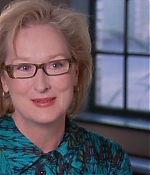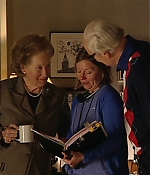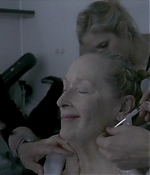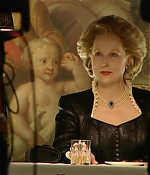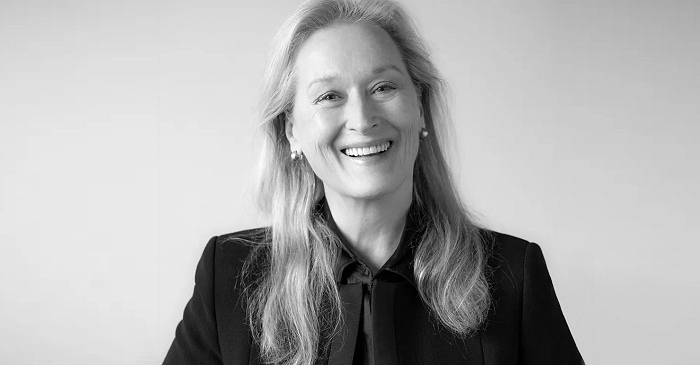|
Simply Streep is your premiere source on Meryl Streep's work on film, television and in the theatre - a career that has won her the praise to be one of the world's greatest working actresses. Created in 1999, we have built an extensive collection to discover Miss Streep's body of work through articles, photos and videos. Enjoy your stay.
|
Celebrating
25 years
of SimplyStreep
|
This Sunday’s spotlight is Meryl’s most recently released film and third Oscar performance in “The Iron Lady”. Since most galleries are up to date already, the image library has been updated with new screencaptures from the film’s making of, including lots of bits from behind the scenes. The videos have been re-organized – most of the official featurettes have been combined and new lengthy a video from the making of has been added as well. Production notes and my review are after the cut. As always, please share your thoughts on “The Iron Lady” in the comments.
Casting an American to play a public figure as quintessentially British as former prime minister Margaret Thatcher was a gamble – even if that actress is Meryl Streep. “The stakes were high,” admits Phyllida Lloyd, who directed the star in 2008’s Mamma Mia! “It’s like an English actress coming to America to play Hillary Clinton. All eyes are on you, and one slip and everyone is going to be going, ‘You come over here and take our jobs…’?” No surprise that Streep rose to the occasion. “It’s not an impersonation in any way – it’s an incarnation,” says Lloyd. The Iron Lady spans seven decades but focuses on the peak of Thatcher’s power in the 1980s. Even moviegoers who don’t warm to Thatcher’s conservatism may find something to cheer. “As much as the film is about the roller coaster of her extraordinary political career,” says Lloyd, “it’s also about family and love and loss and bereavement.” And, of course, one trailblazer’s strict, nonnegotiable policy about wearing pearls.
It was one of those rare, rare films where I was grateful to be an actor and grateful for the privilege of being able to look at a life deeply with empathy. There’s no greater joy. I still don’t agree with a lot of her policies. But I feel she believed in them and that they came from an honest conviction, and that she wasn’t a cosmetic politician just changing make-up to suit the times. She stuck to what she believed in, and that’s a hard thing to do. You want people who are willing to find a solution. I admire the fact that she was a “love-me-or-hate-me” kind of leader who said: “This is what I stand for.” It’s a hard thing to do and no one’s doing that now.
After the first early screenings in the United Kingdom, David Gritten at The Telegraph said: “Awards should be coming Streep’s way; yet her brilliance rather overshadows the film itself.” The Guardian Xan Brooks said Streep’s performance “is astonishing and all but flawless”. He added: “Yet Streep, it transpires, is the one great weapon of this often silly and suspect picture.” The Daily Mail also praised Streep’s portrayal. Critic Baz Bamigboye wrote: “Only an actress of Streep’s stature could possibly capture Thatcher’s essence and bring it to the screen. The film follows Baroness Thatcher from her early years breaking through class and gender barriers to become prime minister to her political downfall in 1990. The Thatcher era from 1979 to 1990, was a time of social and economic change for Britain. Elected following a period of widespread strikes, dubbed the winter of discontent, Lady Thatcher and her Conservative government embarked on tough reforms to tackle inflation and the trade unions. Her policies divided the country – seeing a boom in the service sector and home ownership but a decline in manufacturing and soaring unemployment. While the film was met with mixed reviews, Meryl Streep received universal praise for her performance. She was awarded with a Golden Globe, BAFTA Award and her career’s third Academy Award for playing Margaret Thatcher.
Frederik’s Review
When I saw “The Iron Lady” for the first time, I was disappointed. For a biopic about one of the world’s most controversial politicians, Margaret Thatcher’s career, and what she has done in the decades of her work, is surprisingly fast-forwarded throughout the film. It felt like a “best of” and expects certain knowledge about Miss Thatcher’s actions to understand why she is either loved or hated by her citizens. Instead, for more than half of the film we take a fictional look at the present day Thatcher, suffering from dementia and talking to the ghost of her dead husband. While the makeup and acting for the old Miss Thatcher is a class of its own, it’s all fictional and I could understand the critics arguing about whether it’s necessary to exploit these private issues for a film. Plus, I think the editing and musical choice at times just didn’t fit. So after the first viewing, I strongly felt that this film could have been much better and that a wonderful opportunity had been wasted. However, the second time I watched it, my opinion has shifted. If you get past the fact that time is missing for the scenes of her past years, the present day scenes are very moving and the acting is first-class throughout. There’s the magnificent Alexandra Roach as the young Margaret, who unfortunately gets way too little screen time. Jim Broadbent and the wonderful Olivia Colman are both superb in their performances as well. Speaking of performances, the film is a testament that acting awards should be about the role, not the overall film. Meryl’s performance as Margaret Thatcher is brilliant, she proves once again that she’s still able to totally immerse into a character with empathy and incredible talent. “The Iron Lady” deserves the two Academy Awards it has won, for Best Makeup and Best Actress, are a crowning achievement for a film that is good, but could have been better.

